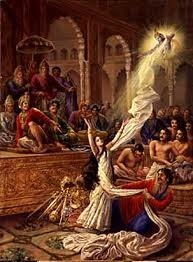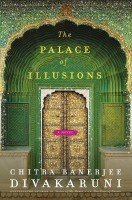The Palace of Illusions
Last week I wrote about the role of women in the Mahabharata. Today I'd like to go a bit deeper into that theme.
We must remember that in Hinduism, the so-called female attributes of selflessness, forbearance and gentleness are seen as positive, whereas the so-called male characteristics of assertiveness, domination and control are considered negative, being traits of the ego that must, eventually, be surrendered to God.
Siva and Shakti, male and female energy, are seen as two halves of a whole, each valuable in its own right, each needing the other as a complement. God can be mother as well as father, and the Mother is, finally, divine. Ideally, women are seen as the invisible backbone of society; it is that backbone that holds society upright, and when it falls, so too, according to Hindu thought, does society. Of course this ideal, humans being as flawed as they are, is seldom realised, and women all too often trodden underfoot in India as everywhere in the world. But it is there, a goal to be aspired to.
In Sons of Gods I’ve tried to get under the skin of the few women, so that the reader understands their inherent, though perhaps quieter, strength.The trouble with “getting under the skin” of the female characters, of course, is that such to do so with every one of the women, and do so thoroughly, would have extended the whole book by a couple of hundred pages, which would defeat the whole purpose of a condensation. And so I was reduced to giving just a glimpse here and there into the inner life of the women: Kunti, when she summons the Sun God in the prologue. Amba, when she is disgraced by Bhishma and seeks revenge. Again and again, Kunti’s feelings for Karna: just a sentence or two that reveal the depth of her love for him.
 And then Draupadi. Thank goodness, another author, Chitra Banerjee Divakaruni, managed to portray a different side to Draupadi in her book Palace of Illusions, so that I ended up understanding and even liking her.
And then Draupadi. Thank goodness, another author, Chitra Banerjee Divakaruni, managed to portray a different side to Draupadi in her book Palace of Illusions, so that I ended up understanding and even liking her.We must remember that in Hinduism, the so-called female attributes of selflessness, forbearance and gentleness are seen as positive, whereas the so-called male characteristics of assertiveness, domination and control are considered negative, being traits of the ego that must, eventually, be surrendered to God.
Siva and Shakti, male and female energy, are seen as two halves of a whole, each valuable in its own right, each needing the other as a complement. God can be mother as well as father, and the Mother is, finally, divine. Ideally, women are seen as the invisible backbone of society; it is that backbone that holds society upright, and when it falls, so too, according to Hindu thought, does society. Of course this ideal, humans being as flawed as they are, is seldom realised, and women all too often trodden underfoot in India as everywhere in the world. But it is there, a goal to be aspired to.
In Sons of Gods I’ve tried to get under the skin of the few women, so that the reader understands their inherent, though perhaps quieter, strength.
The trouble with “getting under the skin” of the female characters, of course, is that such to do so with every one of the women, and do so thoroughly, would have extended the whole book by a couple of hundred pages, which would defeat the whole purpose of a condensation. And so I was reduced to giving just a glimpse here and there into the inner life of the women: Kunti, when she summons the Sun God in the prologue. Amba, when she is disgraced by Bhishma and seeks revenge. Again and again, Kunti’s feelings for Karna: just a sentence or two that reveal the depth of her love for him.
 And then Draupadi. My favourite scene with her is in the famous Assembly Hall scene, where she is dragged by her hair and Duhsasana tries to strip her naked. I won’t drop a spoiler here, but those who familiar with the Mahabharata know what she does; and that is the moment I love Draupadi.
And then Draupadi. My favourite scene with her is in the famous Assembly Hall scene, where she is dragged by her hair and Duhsasana tries to strip her naked. I won’t drop a spoiler here, but those who familiar with the Mahabharata know what she does; and that is the moment I love Draupadi.Then one day a book by Chitra Banerjee Divakaruna fell into my hands: The Palace of Illusions. A whole book told from the point of view of Draupadi: what a delight!
As it was, I was astonished and delighted to see how well the two books complement each other. Divakaruni wrote the entire Mahabharata from the point of view of a single character, which of course means firstly, that the point of view of that character is biased, and secondly, that the reader only gets to see those scenes in which that character is present; everything else is by definition only hearsay, reported by the narrator or by the other characters, and by necessity much condensed. I often wondered, while reading Palace of Illusions, how well a reader unfamiliar with the Mahabharata story would really understand what is going on. But for a reader who does know the story, Palace of Illusions is wonderful; I have to thank Divakaruni for opening up the character of Draupadi and making her a living, breathing character with her own story to tell.
I didn't quite see eye to eye with Divakaruni's attempt to give Draupadi the soul of a modern feminist, railing against her destiny of wife to five husbands, mother of their children. I believe that the sense of Dharma would have been so ingrained into her soul she would not have once questioned that role; from the perspective of a Hindu, this is strength, not weakness. But this is Divakarauni's book, her vision, her Draupadi, and I accept it. The book is simply too good.
Most of all I was delighted with the treatment of Karna in this book. I’ve said it before in various places in this blog, and in the Hindu Blog interview:
Karna is my favourite character. In many shorter versions of the Mahabharata his role is skimmed over; he is merely one of the antagonists, Duryodhana’s right-hand man, Arjuna’s arch-enemy, a villain. And in the longer versions the reader tends to lose sight of him; he is lost amid the sheer vastness of the epic. But I’ve always been on the side of the underdog, and I love the fact that Karna in the role of the underdog actually possesses a secret power, a power he is unaware of. His position is pivotal to the entire story, and I was determined to make this clear. That’s why I brought forward the scene of his conception and began the story with that, as a sort of prologue. It’s to say: watch this guy. He’s important. Don’t forget him. He’s a great character. Flawed, but honourable to his fingertips.

Divakaruni obviously sees Karna in the very light that I did, because, wonder of wonders, in her book Karna is a main character! It’s not a spoiler to say that Palace of Illusions is about Draupadi’s secret love for Karna, because that is the hook of the entire story: and what a Karna we have here! He is just as I imagined him: a truly noble hero, the greatest of them all, whose only flaw is a result of the tragic circumstances of his birth.
And so it is Karna in particular who links these two books: Sons of Gods, that tells the whole story of his life and death, and Palace of Illusions, that tells the story of the woman who loved him most.
Thank you, Chitra Banerjee Divakaruni, thank you a thousand times!
The Palace of Illusions is available through Amazon and at all good booksellers.
Published on March 22, 2015 10:52
No comments have been added yet.



